Sunday, January 1st 2012

HD 7970 Overclocked to 1.26 GHz: 28 nm Tech Really Stretches Its Legs
Welcome to the first TechPowerUp news post of 2012! Read on for a couple of impressive overclocking feats with the HD 7970 graphics card.
It looks like the new AMD Radeon HD 7970 could be a bit of a dark horse and a lot more potent than its stock specifications would suggest - excellent for creating a competitive graphics card market. The reviews at stock speeds show the flagship HD 7970 to be around 10-15% faster than NVIDIA's flagship GTX 580, which doesn't seem all that impressive since the GTX 580 has been on the market for over a year now. However, what the reviews haven't really shown, is what kind of an overclocking monster the HD 7970 is. It definitely looks like AMD could have easily beaten the GTX 580 by a much bigger margin than they did, had they wanted to and it makes one wonder why they didn't.
VR-Zone have spent the New Year weekend overclocking this beast, having reached a whopping 1.26 GHz core clock speed with their HD 7970 - and decent benchmark improvements to go with it. Also, with the fan at 100%, the card never got above a very comfortable 68 degrees centigrade while running Furmark, which is amazing considering how this test is specifically designed to heat a graphics card to the max - but please see the update at the bottom of the article. The stock cooler may be noisy, but it's certainly very effective: an excellent result which will prolong the working life of the card.VR-Zone has tested the card with the latest Sandy Bridge-E Core i7 3960X 6 core CPU. This has a stock clock of 3300 MHz, but they overclocked it to a huge 4680 MHz (42%) to wring the best performance from the card possible. Now, there's an achievement right there. Note that they didn't reveal what CPU cooler was used to achieve this overclock.
The GPU-Z screenshot shows the core clock speed of 1267 MHz. This was achieved "with core voltage bumped from 1.15v to 1.25v using publicly available software and a special bios (9th Jan reveal), we got the core clock speed up to 1267MHz." The standard card is BIOS-locked to a maximum clock ceiling of 1125 MHz on the core and 1500 MHz on the memory, which it can handle with ease.
3DMark 11 Performance Preset (stock is P8227)3DMark 11 Extreme Preset (stock is X2764)ComputeMark (stock is 5920 marks)Unigine Heaven 2.5 (stock is 69.6fps)With results like these, AMD have set a high bar which NVIDIA will have its work cut out to beat and it'll be really interesting to see what Kepler brings to the table in the next few months. Also, overclocking legend Shamino has managed to push one of these cards to an astounding 1.7 GHz+ on LN2! Read about it here.
So, as of January 1st 2012, the HD 7970 extends its lead as the undisputed single GPU enthusiast card of choice for straight-line framerate performance and smooth gameplay in demanding games. A great way for AMD to start the year.
UPDATE: Notice how the Furmark screenshot shows the card achieving a mere 40fps at 1280x720? A card in this performance bracket can obviously do way better than this. This poor framerate will be down to the power throttling circuitry protecting the card under such conditions by slowing down the performance severely. If the throttle was disengaged the card would perform spectacularly for a short while and then likely cook itself to death, especially with this overclock. Thanks to one of our eagle-eyed forum members for spotting this.
It looks like the new AMD Radeon HD 7970 could be a bit of a dark horse and a lot more potent than its stock specifications would suggest - excellent for creating a competitive graphics card market. The reviews at stock speeds show the flagship HD 7970 to be around 10-15% faster than NVIDIA's flagship GTX 580, which doesn't seem all that impressive since the GTX 580 has been on the market for over a year now. However, what the reviews haven't really shown, is what kind of an overclocking monster the HD 7970 is. It definitely looks like AMD could have easily beaten the GTX 580 by a much bigger margin than they did, had they wanted to and it makes one wonder why they didn't.
VR-Zone have spent the New Year weekend overclocking this beast, having reached a whopping 1.26 GHz core clock speed with their HD 7970 - and decent benchmark improvements to go with it. Also, with the fan at 100%, the card never got above a very comfortable 68 degrees centigrade while running Furmark, which is amazing considering how this test is specifically designed to heat a graphics card to the max - but please see the update at the bottom of the article. The stock cooler may be noisy, but it's certainly very effective: an excellent result which will prolong the working life of the card.VR-Zone has tested the card with the latest Sandy Bridge-E Core i7 3960X 6 core CPU. This has a stock clock of 3300 MHz, but they overclocked it to a huge 4680 MHz (42%) to wring the best performance from the card possible. Now, there's an achievement right there. Note that they didn't reveal what CPU cooler was used to achieve this overclock.
The GPU-Z screenshot shows the core clock speed of 1267 MHz. This was achieved "with core voltage bumped from 1.15v to 1.25v using publicly available software and a special bios (9th Jan reveal), we got the core clock speed up to 1267MHz." The standard card is BIOS-locked to a maximum clock ceiling of 1125 MHz on the core and 1500 MHz on the memory, which it can handle with ease.
3DMark 11 Performance Preset (stock is P8227)3DMark 11 Extreme Preset (stock is X2764)ComputeMark (stock is 5920 marks)Unigine Heaven 2.5 (stock is 69.6fps)With results like these, AMD have set a high bar which NVIDIA will have its work cut out to beat and it'll be really interesting to see what Kepler brings to the table in the next few months. Also, overclocking legend Shamino has managed to push one of these cards to an astounding 1.7 GHz+ on LN2! Read about it here.
So, as of January 1st 2012, the HD 7970 extends its lead as the undisputed single GPU enthusiast card of choice for straight-line framerate performance and smooth gameplay in demanding games. A great way for AMD to start the year.
UPDATE: Notice how the Furmark screenshot shows the card achieving a mere 40fps at 1280x720? A card in this performance bracket can obviously do way better than this. This poor framerate will be down to the power throttling circuitry protecting the card under such conditions by slowing down the performance severely. If the throttle was disengaged the card would perform spectacularly for a short while and then likely cook itself to death, especially with this overclock. Thanks to one of our eagle-eyed forum members for spotting this.
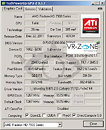
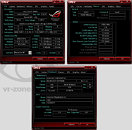

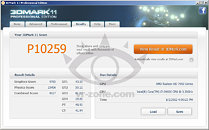
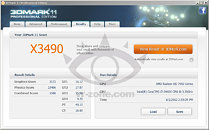

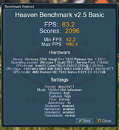
56 Comments on HD 7970 Overclocked to 1.26 GHz: 28 nm Tech Really Stretches Its Legs
That is more than 1.21 gigawatts!
^that couldn't be more incorrect. :\
We all remember the original fermi. That is not AMD's goal. Sucking a full 300W the 7970 could run much faster.
That lesson tought me that sometimes with the right PCB you can get some amazing results that you just wouldn't reach with a reference one
A better board will improve on things like voltage regulation (more stable); signal integrity; electrical noise; signal timings around the board (these can be critical); heat generation and dissipation and a lot more subtle effects, such as parasitic board capacitance.
This is why quality CPU motherboards cost so more for example, besides the extra features they offer.